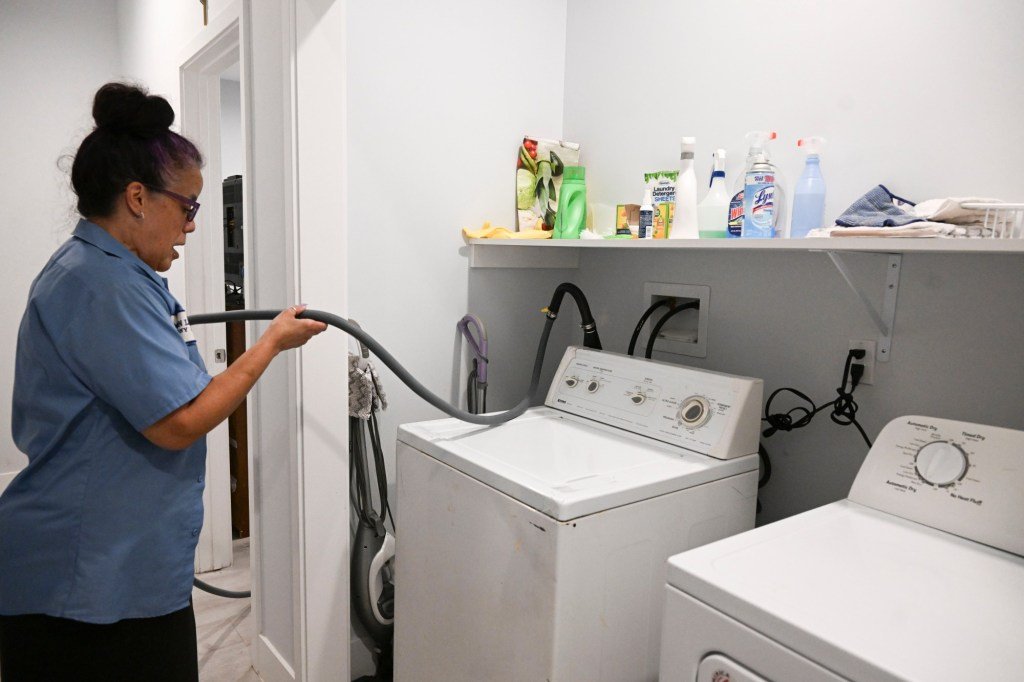Nearly three years ago, tenant advocate Zerita Jones organized a housing protest at a black-tie event attended by real estate tycoon Swaranjit “Mike” Nijjar and his wife, Patty.
The insistence of tenants like Zerita Jones reverberated through the opulent chandeliers of the Pasadena Convention Center during the Crystal Ball gala. As guests donned tuxedos and elegant gowns, a small group of activists outside rallied for justice, accusing Nijjar, a figure epitomizing the exploitative landlord culture, of neglecting his tenants’ most basic living conditions.
The Protest That Shook a Gala
In November 2022, Jones led a dual-front protest at the gala, intended to benefit communities served by Methodist Hospitals. Half of the protestors staged outside while others infiltrated the gala’s splendor, chanting, “Mike Nijjar is a slumlord!” in defiance of the celebratory atmosphere.
Jones recounted her rare direct encounter with Nijjar amidst the commotion, “I just politely walked up to him and put my hand on his shoulder. I asked, ‘Do you think you might be able to have a conversation?’” Nijjar nodded, yet no follow-up dialogue ensued. For nearly a decade, Jones and her fellow tenants have pushed for discussions that never materialized.
Baldwin Hills: A Community in Distress
Located in the heart of Baldwin Hills, the Chesapeake Apartments represent a microcosm of the issues many low-income renters face in California. Jones helped establish the Baldwin-Leimert-Crenshaw chapter of the Los Angeles Tenants Union, fighting Nijjar’s empire that encompasses over 22,000 rental units across several counties.
- Deteriorating Conditions: Alleged negligence includes rampant mold, rodent infestations, and deferred maintenance.
- Legal Challenges: Jones participated in lawsuits exposing Nijjar’s tenants to eviction threats stemming from dubious claims of gang activity.
- Community Mobilization: Jones and the tenants successfully demanded inspections that revealed unacceptable living conditions.
Jones criticized the business model that places profit above tenant welfare: “They get people in at high rent and then ignore repairs until it’s overwhelming. This behavior is systemic across their properties.”
Attention from the Attorney General
This history of alleged tenant exploitation has led to unprecedented legal scrutiny, culminating in a comprehensive lawsuit filed by California Attorney General Rob Bonta in June 2025. This litigation attacks the heart of Nijjar’s operations, formally accusing him and his family-run businesses, known as PAMA Management, of widespread violations of tenant rights.
Bonta describes here as a significant step, noting, “These violations are not merely mistakes; they are entrenched business practices.” He highlights the overarching issues tenants have faced, such as:
- Unsafe living conditions, including infestations and deteriorating infrastructure.
- Discrimination against low-income applicants, particularly those using housing vouchers.
- Failure to perform necessary repairs, frequently leading to uninhabitable conditions.
Experts believe this case symbolizes a shift in California’s approach to landlord accountability. “It signals a serious recognition of the contextualized challenges faced by low-income tenants,” stated Dr. Samuel Rodriguez, a housing policy expert at UCLA. “It’s about time the state stepped in.”
The Price of Inaction
Many tenants, like Deirdre Larson and Shonnette Mosley, echo their frustration with PAMA’s delayed responses to maintenance issues. Larson, fighting eviction while caring for a disabled ex-husband, described a host of unresolved issues: “The management says they’ll get to it next week, but nothing ever changes.” Mosley, a resident at Virginia Circle Apartments, lamented, “They care more about profits than our safety.”
According to a recent study by the California Tenants Union, approximately 30% of low-income renters report unsatisfactory living conditions but fear retaliation if they speak out. This troubling statistic reveals a systemic pattern of fear that stifles tenants from demanding what they rightfully deserve.
An Empire Built on Neglect
Nijjar’s companies have faced scrutiny for code violations and alleged negligence; his extensive real estate holdings reportedly yield over $100 million in profits from affordable housing rentals alone. Yet, beneath this façade of wealth lies a troubling narrative of tenant exploitation and systemic oversight. The state’s lawsuit aims to impose penalties and restrict Nijjar’s operations as a way to reign in his alleged abuses.
Nijjar’s attorney contests the claims, asserting, “Mr. Nijjar and his companies provide an extraordinary service to housing those disadvantaged.” Yet, tenants counter this narrative with lived experiences of desperation and fear.
Braving the Future Together
As this unfolding drama continues, conversations surrounding rental reform intensify. Community organizations, such as the Alliance of Californians for Community Empowerment, are mobilizing residents and pressuring local governments to catalyze real changes in housing laws.
In turn, tenant advocates like Jones remain steadfast in their resolve, stating, “Our fight is far from over.” The momentum built through protests, community organizing, and legislative advocacy signals a paradigm shift toward empowering renters to reclaim their rights—a resistance against a backdrop of wealth inequality and systemic neglect.
The hope is that with continued advocacy and public awareness, stories from Baldwin Hills will no longer be marginalized but will act as catalysts for foundational changes in California’s housing landscape. Here, the struggle transcends mere survival; it embodies a powerful quest for dignity and justice.





